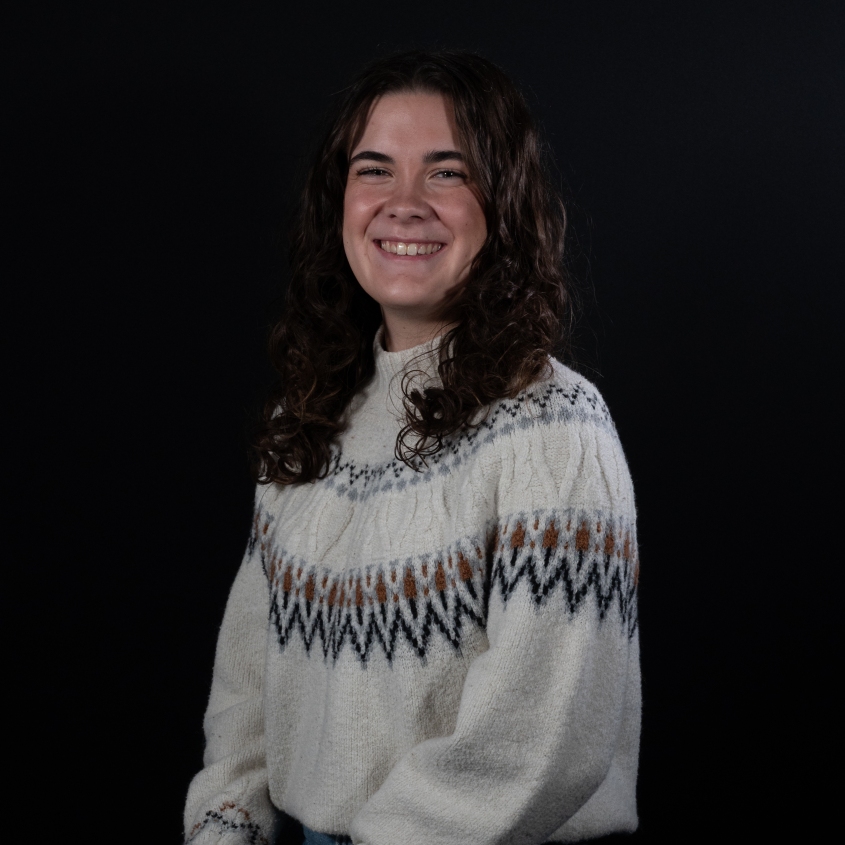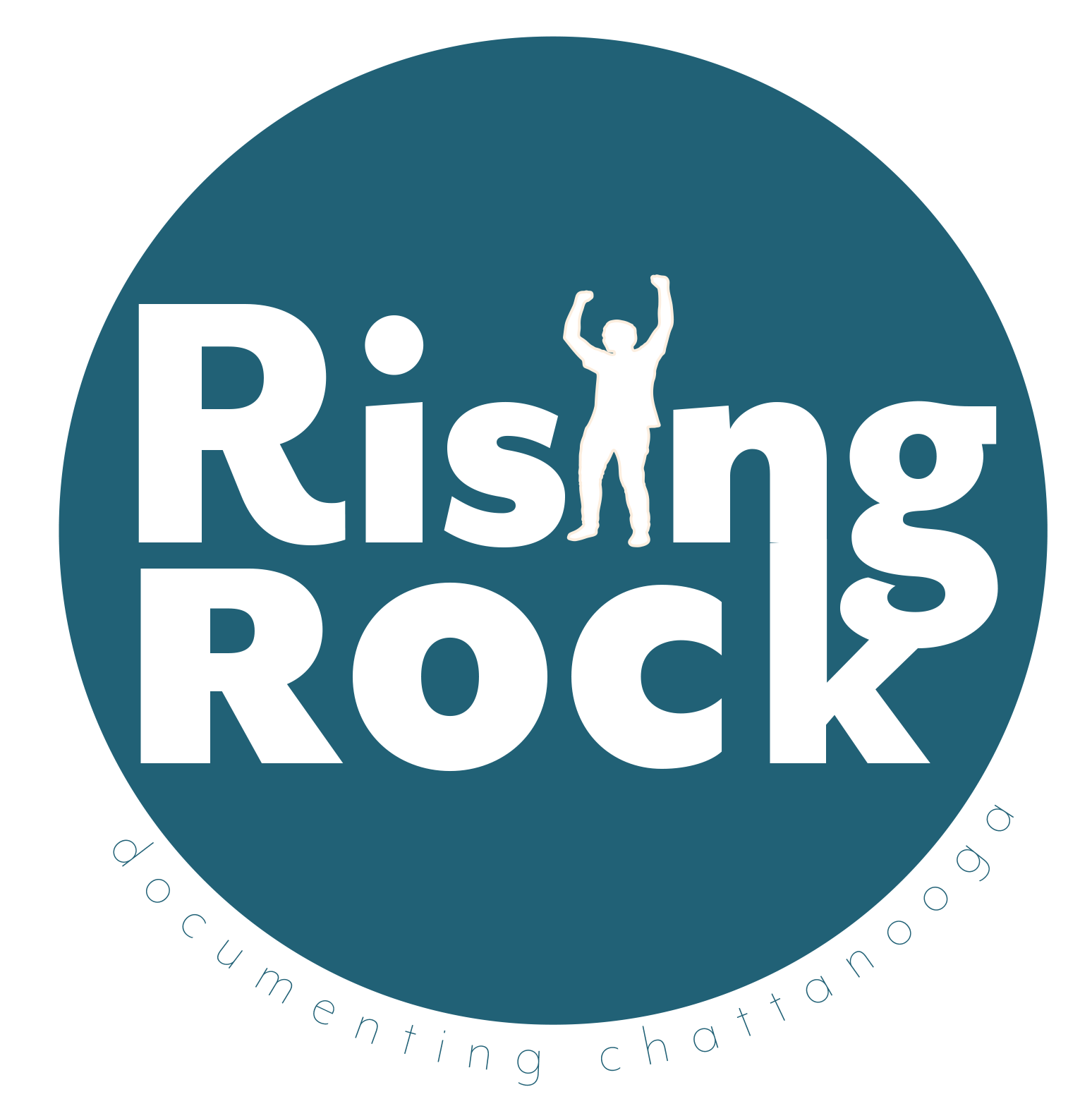Written by Taylor McKinley
As the moon intercepts perfectly between the earth and the sun, casting a shadow, a solar eclipse brings individuals from all walks of life together, all pausing to gaze upward and witness history.
Over 200 patrons gathered around the Chattanooga Public Library on April 8, 2024 starting around 2:30 P.M. to witness the rare solar eclipse through Oreos, protective glasses and interactive games.
“For this eclipse we really made sure that people know that they can get glasses here,” Courtney Lewis, Chattanooga Public Library activities director, said. “That we are going to be celebrating with them, so there are going to be a lot more people that have a central place where they can come do fun things and experience it in a safe place. “

Lining up outside of the library thirty minutes early, people waited to receive their eclipse glasses and complimentary Oreos. After receiving them, they immediately found a spot to sit in the grass along the Broad St. sidewalk. Parents helped children find the eclipse, adults from nearby offices made trips outside, and everyone stopped to look up at 3:04 to witness peak totality alongside the community.
The last eclipse happened in October of 2023 and was an annular eclipse. This is because when the moon is in the intersection between the sun and Earth, it is further away from Earth than it is during a solar eclipse. This is why it results in the moon not covering as much as the sun.
“If you were just kinda walking by you might not even realize it was happening,” Lewis explained.
However, Lewis feels that one of the most important aspects of eclipses is its ability to bring the community together and the educational opportunities it provides. Seeing something like a solar eclipse appear gives those witnessing a sense of unity as they come together to witness a rare event.

“You don’t realize how cool it is until you see people’s faces observing it,” Lewis said. “You’re experiencing nocturnal events in broad daylight, and it is just amazing because you know you will probably not get to experience it again anytime soon.”
The visibility of solar eclipses depends on where you are on Earth’s surface, making totality even more shocking for those who look up and witness history. According to NASA, this only happens occasionally because the moon has a different orbit than the sun and Earth, so the exciting time they are aligned is called eclipse season.
“The sun is 400 times further away from Earth than the moon is,” Lewis said. “That proportion is really weird and does not happen with other planets, so the fact that we can even experience a total eclipse is really unique.”
Lewis remarked that the library’s event was catered towards children that are homeschooled, primarily because the time of totality of the eclipse lines up with the school dismissal of Hamilton County Schools. While HCS had no special plans for the eclipse, the library made sure to give this experience to kids who could come.
“Libraries have been involved with solar eclipses for a long time,” Lewis explained. “We cover this whole wide range of things from the time your kid is born all the way to 12th grade.”

The Chattanooga Library provided a place for children especially to learn about the eclipse, represented with crescent shaped oreos and a real representation of how an eclipse happens. However, Lewis emphasized that nothing beats the experimental learning they receive when they have the opportunity to see an eclipse in person. Following their mission to educate, children were taught how to put eclipse glasses on properly. In an interactive way, surrounded by other kids, they also learned about why the eclipse happens.
“I think the biggest takeaway is just the wonder of it all. We are going to be there sharing facts with them and I am sure any of those facts will stick with them,” Lewis said in anticipation of what the eclipse event would be like. “I think it will make more of an emotional punch than a factual one.”
The public library provided a great environment for the eclipse, but they play a significant role in educating children of all ages year round. One program being STEAM, which plays a role in experiential learning for fourth through eighth graders with thorough hands on learning.
“If you don’t know where to go we are sort of that central hub, for the eclipse but also for things in general,” Lewis explained. “We want to give people access to as many things as we can.”
As another eclipse unfolded, the Chattanooga community was able to grow closer through this experience. For those who missed this solar eclipse, the next opportunity to witness history in the United States is expected to be August 23, 2044.
Teaching Totality
Written by Abby Yorke

Whether a teacher in Tennessee, Georgia or Iowa, many feel they have a duty to help students to experience new things and help them learn through those experiences. Ann Hegstrom, a retired teacher from Iowa, wants to encounter the eclipse so that she can bring that experience to kids who might not have the opportunity, even though she is not teaching at the moment.
With her camera and telescope in hand, she drove over 400 miles to be able to experience the solar eclipse in full totality, something she has been wanting to experience so she can share that with others.
While teaching children who are blind or visually impaired, Hegstrom has a different understanding as to just how important it is to teach younger generations about natural phenomena.
“Later in my career, I taught students who are blind and visually impaired. So that brings a new element of why you bring the world to the students,” Hegstrom said. “There are a lot of tactile and Braille ways for kids to see that. So I can take an image like that and I could transform it so that they could feel the details.”
Even now that she is retired, she is still using her experiences to share her sense of adventure with others, whether that is through photography Facebook groups or just sharing experiences with the people she meets.
Teaching kids about the eclipse is something many teachers around the country have incorporated for years. Shelbie Fielder, first-grade teacher at Rivermont Elementary, and Jane Yonts, a retired teacher from Walker County, Georgia, have been advocating for the importance of teaching about astronomy and space.
Shelbie Fielder and her first grade class looked up in awe as the moon crept in front of the sun. While there was not full totality in Chattanooga, Fielder still made an effort to teach her students about the importance of the eclipse.
“We really tried to make it a fun experience and the whole day was basically solar eclipse day because I don’t think it’s going to happen again for around maybe 20 years,” said Fielder.
Fielder along with other teachers at Rivermont Elementary School used the freedom that they were given to make this eclipse a fun experience for all of the kids. Most of the kids in Fielder’s class were very young or not even born yet when the 2017 eclipse happened so this eclipse was focused on making this a phenomenon that they will never forget.

“They were laying on the ground or sitting down and then when they see it, they’re screaming and were so excited,” Fielder said. “So I think it was really fun because they have never experienced anything like that before.”
Yonts, a retired teacher from Walker County, Georgia, has experienced three total eclipses in her lifetime. Through these experiences, she has been able to bring back the things she has seen to her students.
Yonts’ husband, Tim Yonts, has been able to experience all of these eclipses with her and has been able to see first hand how important it is for students to learn about the eclipse.
“It’s a great opportunity if you were a teacher of science with children to explain and really give a hands-on approach,” Yonts said. “It’s not just in a classroom, it is ‘I’m standing outside in an eclipse.’”
Experiences like the eclipse are few and far between and teachers know how important it is to make sure their students not only experience this sensation but have fun while doing it. These moments are going to be what kids remember for years to come and inspire them to keep adventuring and learning.
“I’m hoping not only do I bring the world to them,” Hegstrom said. “But I also bring that sense of adventure that no matter what your circumstances, you can find adventure in life.”
Meet the Storytellers

Bethany Cothran is an adventurous, fiercely driven multimedia journalist always going above and beyond in her work. Serving as Features Editor for The University Echo, President of UTC’s NPPA student chapter, and Editor of Rising Rock, Cothran is consistently striving to improve her skills. While she specializes in writing and photography, Cothran is well-versed in audio and video as co-host of UTC’s Psychology Podcast. As a senior majoring in communication and psychology, Cothran is a passionate storyteller, leader, and advocate for mental health, always working to give others a chance to be heard. To connect or collaborate with her email jwq377@mocs.utc.edu or message her on LinkedIn.

Trevor Jolley is a Junior at the University of Tennessee at Chattanooga majoring in Communication. A passionate individual for all big moments, Jolley specializes in sports photography. Always looking for the best shot, Jolley can be found on the sidelines as he serves as the team photographer for Chattanooga Mocs Wrestling, as well as Chattanooga Mocs Football and all things athletics for the University Echo. To connect or contact with him, reach out at ryf849@mocs.utc.edu.

Taylor McKinley is a Visual Storyteller majoring in communication and minoring in marketing at UTC, graduating May of 2024. McKinley combines her leadership, creativity, and passion for social media campaigns to bring those in her community together. McKinley admires using written work, photography, and audio pieces to tell the stories of those who can’t. As the Social Media and Advertising Manager of The University Echo, McKinley is always excited to find new stories, meet new people and learn new things. Outside of storytelling, McKinley has experience as a Digital Marketing Intern where she has experience with editing, content creation, SEOs and web design. To connect with Taylor McKinley about future opportunities, email her at WZS675@mocs.utc.edu.

Alondra Mejia-Rendon is a senior at the University of Tennessee at Chattanooga majoring in Communications with a minor in International Relations. She is currently a producer for Mocs News and a videographer for Rising Rock. She is passionate about showcasing stories for underrepresented communities and aspires to have a career in broadcasting. To collaborate with Alondra, reach out to her at xcg315@mocs.utc.edu.

Abby Yorke is in her last semester majoring in communication with a minor in art history at the University of Tennessee at Chattanooga. Yorke is a visual storyteller, focusing on photography as well as videography. She has served as the photo and social media intern for UTC Women’s Basketball for 2 seasons. Here she is able to showcase her passion for sports photography through working games as well as behind the scenes. When she is not working or at a game, she is involved with The House, a campus ministry, where she has grown in leadership skills and working as a team. To contact her, please reach out to jmv993@mocs.utc.edu.
